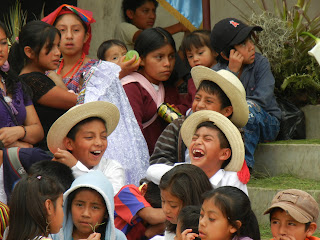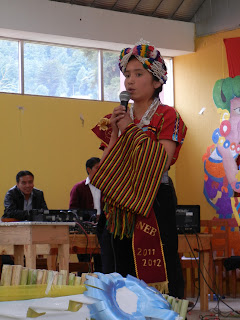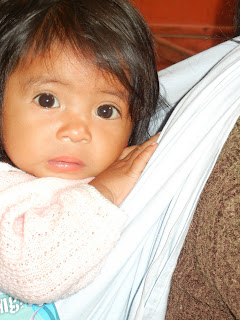It’s Christmas Day and I’m sitting on the patio of a coffee shop on Providenciales, Turks and Caicos waiting for my Dad, Beth, and Hannah’s plane to arrive. Their morning flight was cancelled, and they won’t arrive until 8 tonight, so I spent the morning on the beach, and then treated myself to a latte and Greek salad for lunch. I whiled away the afternoon reading and sipping on my latte. I thought that my first trip out of Guatemala would be wracked with culture shock, but I find myself easing into my old lifestyle as if I had never even left. This has left me thinking about the relative comfort of my life in Guatemala. I spent most of 2010 and the first four months of 2011 mentally preparing myself for twenty-seven months of dirt-floored houses without electricity, bucket baths, latrines, cooking rice and beans over a wood fire, minimal communication with my friends and family… basically a life without the worldly comforts that we, as Americans, take for granted every day. This romantic notion of the Peace Corps is what so many of us held in our hearts until the day we stepped off the plane in Guatemala City.
My life in Guatemala is, as it turns out, nothing like I expected. I often think of myself as, rather than a Peace Corps volunteer, a woman living and working in Guatemala. I think this feeling stems from the regularity of my schedule, my abundance of sitemates, and the surprising comfort of my living situation. Despite the occasional lack of protein in my diet, I think I eat better in Guatemala than I did in the US. I live in my own 2-room house with electricity and tile floors, I have an oven and a refrigerator (on loan from a group of Canadian dentists that come to Guatemala twice a year), and I recently had a hot shower installed in my bathroom. I have regular dinners with the five other volunteers that live within a 30-minute radius of me. I have a cell phone and internet, and I skype with my family and friends on an almost daily basis. For months, all of this gave me doubts about the “authenticity” of my Peace Corps experience. I would lie in bed wondering if this is what life as a Peace Corps volunteer should be like. Is this what we signed up for? Is it less of an adventure if I’m not malnourished and living in a mud hut? Is it less of an adventure if I am not only able to talk to – but also to see – my loved ones in the US with the click of a button? Is it less of an adventure if I’m so close to home that I’m able to go on a Christmas vacation in the Caribbean with my family? I’ve recently realized that the answer to all of these questions is no. It’s not any less of an adventure, it’s just a different adventure than the one I had visualized time and again leading up to my arrival in Guatemala. The comfort of my life and the quality of my alimentation make me a happy and able volunteer. I wake up every morning feeling healthy and ready to take on the challenges of working in a broken and failing school system. Every night, if I choose, I have the opportunity to decompress by talking to a loved one about the triumphs and challenges of my day.
Peace Corps is not about proving how tough you are by living in dismal conditions. Peace Corps is about service. As I have come to see it, my quality of life gives me the opportunity to commit myself wholly to my service. Many label Peace Corps Guatemala as the “Posh Corps.” I have yet to decide whether or not I agree with that label, but I have decided that, even if I am serving in the Posh Corps, I’m no less of a Peace Corps volunteer than the one living in a mud hut in sub-Saharan Africa. In just my first five months of service, I’ve built solid working and personal relationships, I’ve gained the trust and respect of the vast majority of my students, and I’ve planned and executed surprisingly successful secondary activities. Peace Corps’ favorite phrase is “capacity building.” My lifestyle in Guatemala has given me the opportunity to build the capacities of my students and teachers, and I now realize that I wouldn’t have it any other way.


























































